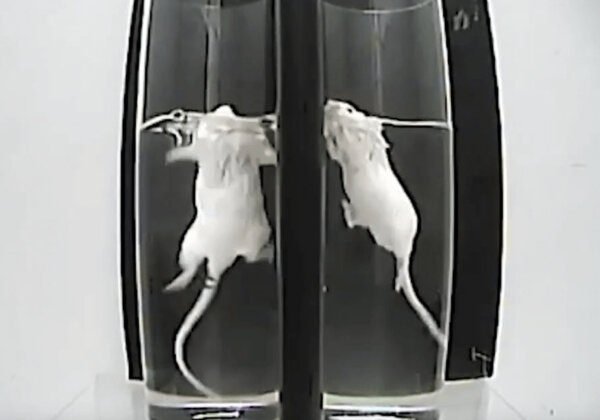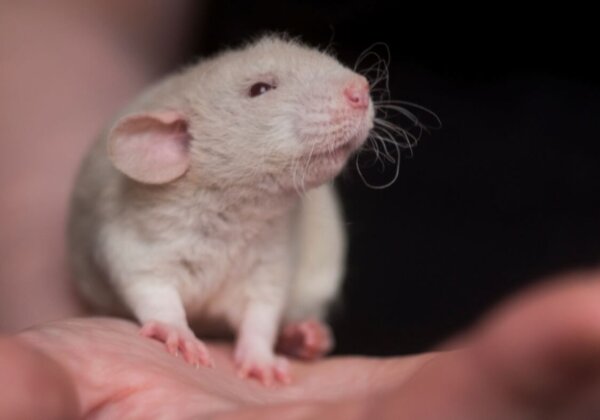Latest Figures: Animals Used in Laboratory Research and Teaching in Australia
Right now, in laboratories all over Australia, terrified dogs, cats, rabbits, piglets, primates, and other animals are languishing inside cages or being used in invasive, painful research procedures, often ending in their deaths.
Many of us don’t realise just how many species are involved, and, because of gross under-reporting, none of us knows exactly how many thinking, feeling individuals are suffering.
In fact, until now, the most recent year for which stats were available was 2016.
Thanks, though, to a new report from Humane Research Australia, we now have a better idea of the number of animals used for experiments in Australia – at least in 2018 – and it paints a grim picture of speciesism and bad science.

More Than 10 Million Animals Used
The latest available figures show that in 2018, 2,253,943 animals were used in Victoria, 2,253,943 were used in New South Wales, 255,015 in Tasmania, and 740,458 in Western Australia.
In Queensland, 4,545,288 animals were used during the state’s reporting period (which is the 2018–19 fiscal year).

Reporting Is Woefully Inadequate
Unfortunately, Australia does not maintain a national system to collate statistics concerning animal use, meaning there are huge gaps in reporting – and public knowledge. As a result, figures for 2018 are not currently available for South Australia, the Australian Capital Territory, or the Northern Territory.
However, statistics from previous years indicate that South Australia used an average of 315,822 animals per year, the Australian Capital Territory used an average of 122,628, and the Northern Territory used an average of 160,792.
Therefore, the approximate total number of animals used in Australia in 2018 is around 10,704,499.
However, the fact that we have only incomplete data from 2018 highlights just how overdue – and vital – a federal government–controlled reporting system is.

A monkey at the National Primate Breeding and Research Centre, Hazelwood South VIC, Australia.
Animal Testing Is Bad Science
Ethical arguments aside, using animals in experiments is simply bad science. There are significant differences between humans and other species, rendering most experiments scientifically irrelevant.
The National Institutes of Health in the US – the world’s foremost funder of medical research – notes that 95% of all new medications that are shown to be safe and effective in animal tests fail in human trials because they don’t work or are dangerous. Not only that – of the small percentage of drugs approved for human use, half end up being relabelled because of severe and even deadly side effects not identified in animal tests.
Studies show that 90% of basic research, most of which involves animals, fails to lead to human treatments.
“Ask experimenters why they experiment on animals, and the answer is: ‘Because the animals are like us.’ Ask experimenters why it is morally okay to experiment on animals, and the answer is: ‘Because the animals are not like us.’ Animal experimentation rests on a logical contradiction.”
– Prof Charles R Magel
Animal tests are also costly – breeding, feeding, housing, and, eventually, disposing of animals isn’t cheap.
Imagine if all the energy, time, and money spent on archaic animal tests were funnelled into creating and advancing modern, relevant innovations, such as human clinical and epidemiological studies, human tissue– and cell–based research methods, cadaver use, computational models, and technology like organs-on-chips.
You Can Help Keep Animals out of Laboratories
PETA and other animal rights groups are working hard to end animal use in laboratories. Here’s how you can help:
- Buy only cruelty-free products. If you aren’t sure whether your favourite brands drip chemicals into rabbits’ eyes, check out PETA US’ Global Beauty Without Bunnies
- Speak out against the forced swim test. This cruel and unnecessary experiment is still being used by Australian and New Zealand universities.
- Adopt an animal rescued from a laboratory. Organisations such as the Liberty Foundation Australia make it possible for compassionate people to take advantage of “right to release” laws so that they can adopt animals formerly used in laboratories (who would otherwise be killed). From mice and guinea pigs to dogs and cats, these animals are waiting for loving homes.
- Spread the word. If you’re surprised to learn that over 10 million animals suffer in Australian labs every year, your friends, family, and followers probably will be, too! Share what you’ve learned, and help shed light on the darkest places.
Finally, please sign our petition urging the Australian government and national research councils to implement a policy that mandates an end to animal experimentation and provides a clear strategy and timeline for achieving this goal.







